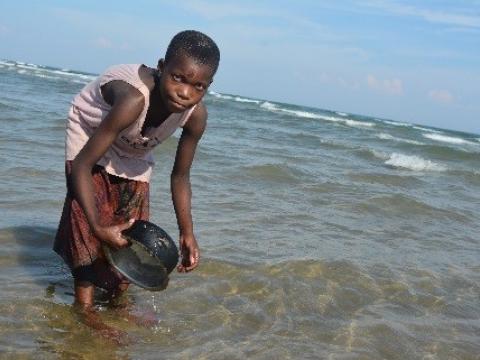Advocacy efforts keep children in school and off-shore in Malawi

By Wezzie Gondwe
Nine -year-old Olipa’s dream is to become a medical doctor upon completion of her studies, but living in a lakeside village near the shores of Lake Malawi Nine makes her ambition harder to accomplish. Children in these villages have long missed school preferring or being forced to help their parents with fishing or farming activities.
Fast forward to 2017 and Olipa’s ambition to become a medical practitioner is back on course, thanks to an initiative that seeks to keep children in school and off the lake. The nine-year old now attends school classes every week day, leading to a marked improvement in her performance.
Not even the allure of the majestic Lake Malawi or the call of traditional chores can tempt Olipa and her friends to skip classes as was the case before. For these pupils know full well that missing classes now has consequences. The lake has become a no go area during school hours with offenders having to answer to a task force called 997.
Olipa’s lakeshore villages falls under World Vision Malawi’s Sanga Area Program, in Nkhatabay District. On a typical day here, both parents and children would be involved in fish vending, rice farming and traditional dances. These activities have been blamed for the high school dropout rate in the area.
A survey carried out in 2010 indicated that the school dropout rate in Nkhatabay district was 4.7%. Fishing and farming were some of the indicators that fueled this dropout.
World Vision, through its Sanga Area program, noted the challenge in the area and decided to act. Mankhambira Sambizga Mwana project, a local level advocacy project funded by the Tilitonse Fund, was established.
The project’s objective was to ensure education governance in Nkhata-bay is more inclusive, accountable and responsive to citizens’ needs by 2017.The project uses an advocacy approach called Citizen Voice and Action (CVA). CVA is premised on Article 21 of The Universal Declaration of Human Rights, which seeks to guarantee that ’Everyone has the right of equal access to public service in his country’ -
One of the CVA’s achievements in the area has been to ensure that fishing and farming activities do not lead to children’s absenteeism from school.
Mankhambira Sambizga Mwana project Coordinator, ,Arthur Mpumulo says the initiative first trained Village Development committees (VDCs) and Parents and Teachers Associations (PTAs) in empowering and promoting education.
“We later thought of involving the youth and recruited them to be CVA monitors. Through CVA these youths decided to form this group 997 which works as a mobile community police task force to remove children from the lake to go to school,” says Mpumulo.
Chairman of the monitors’ group, Mzimoya Nyamwera, says the community is appreciativeof the inititive to keep children in school and off the shores.
“Since we started 997, there is a drop in the number of children involved in various activities like fishing during school hours. We are not going to stop what we are doing since we have been encouraged with the outcome,” says Nyamwera.
In addition he says if a child is caught fishing during school hours, the parents are summoned to pay a fine.
Seventy-year-old community members, Lexa, confirms that more children in the area are now attending classes every school day. He adds that the lake and farms are no longer a priority as parents show they value the importance of education.
“My grandchildren are now doing better in school because they are attending classes every day. I am happy with this initiative. There are people in this village who didn’t go to school but are making sure all children are going to school,” says Lexa..